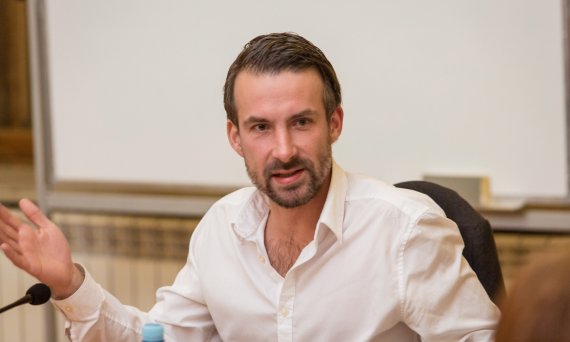Frank Ruda (Free University of Berlin) gave a lecture as part of the Department of Political Science and Sociology’s interdisciplinary seminar, in the EUSP’s Gold Hall. In his speech, Ruda raised the following questions: What is political affect? Is there a genuine political affect? What are its specifics?
In experience, there exists something that can be defined as collective political happiness. Contemporary political thought maintains that there is an affect that appears to be genuinely political; people have a political dimension. This speaks to the following provisions: political experience exists only as a shared experience and the conditions of any political action are a specific mutual recognition of the actors. Affect is also recognized as a necessary agent — a condition of political relations and political action.
Which Affect Are We Talking About?
Kierkegaard, Freud, Lacan, and Heidegger recognized one basic affect—anxiety. Anxiety at its core is different from fear: fear has an object, anxiety does not. Anxiety is an intimate feeling, individualized and impossible to communicate.
Lacan gave several characteristics of anxiety that could be helpful for our discussion. Anxiety refers to the very condition and basic presentation of objects of reality. The reasons for it are non-localized, making it impossible to escape. Anxiety reveals the absence of need for the world as it is, and generates the feeling that things are not necessarily what they appear to be and could indeed be otherwise. Anxiety reveals my “I,” an “I” experiencing anxiety (a mechanism similar to the Cartesian “cogito ergo sum”). Lacan expanded on Heidegger in asserting that anxiety has no object, or rather, he defines anxiety as having a special type of object — the passing object. The passing object cannot be specified, nor can it be located in space. Lacan considers the Voice and the Gaze to be passing objects.
Badiou, in contrast to the above mentioned thinkers, identified two basic affects: anxiety and courage. Courage works to overcome the loneliness spawned by anxiety. Political action, which, according to Badiou, is one of the four “truth procedures,” corresponds to the affect of enthusiasm, which is connected to the basic affects.
Kant provides a concept equivalent to enthusiasm, which he defined as wishful participation.
Hegel identified two affects related to political action: patriotism and indignation. The affect of indignation arises out of society’s contradictions. Society during Hegel’s time was faced with a contradiction between its understanding of freedom and the possibility of realizing this freedom. After the Reformation and the establishment of formal equality, freedom came to be understood as self-determination, as self-realization in conditions that encouraged investment in one’s own labor. Society has arrived at a state where the law had declared equality, but not everyone received the conditions of investing in their own labor. The phenomenon of poverty arose only after the Reformation—it was not known in Antiquity or during the Middle Ages. Poverty arises only when formal equality is declared, but imposed mechanisms don’t work; when work ethic is strengthened but there is not enough work.
Hegel condemned the concept of individual freedom in bourgeois society as untenable, exposing its fundamental contradictions and revealing that poverty is inherent in such a societal arrangement. Hegel not only criticized the status quo, but also anticipated its criticism, recognizing it as a defense mechanism of the system.
Hegel wrote that an uprising of the poor would be a rebellion against the very possibility of poverty. He defined the affect of indignation experienced by rebels as collective anger. He also noted that uprising was due to complex mechanisms of affect, and did not stem directly from certain objective conditions. Poverty, according to Hegel, is a necessary element to bourgeois social order, but the particularities of this order don’t explain the possibilities of losing a neutral relationship to it. Rebellion is always spontaneous. Those who have risen spontaneously declare their right to exist without labor—which is ultimately impossible, a situation for which there are no conditions.
Ruda then directed our attention to the fact that indignation is not a political but rather a pre-political affect. It marks a place where the political may serve, but by itself it does not constitute a political affect.
The Hegelian idea of indignation is strongly linked to the aforementioned affect of anxiety. Indignation is only possible in a world where it is possible to communicate the feeling that “the status quo is not necessary.” The affect of anxiety ensures this feeling. Anxiety, weighing upon the world, reveals that things could be otherwise.
Indignation points to the possibility of a political event and the possibility of changing the current situation, but on its own is not enough to constitute a political action. A return to Badiou helps us to define the political affect as a move from a state of indignation to one of enthusiasm. Enthusiasm is a genuine political affect, which Badiou associates with the concept of positive infinity.
Darya Valitova











